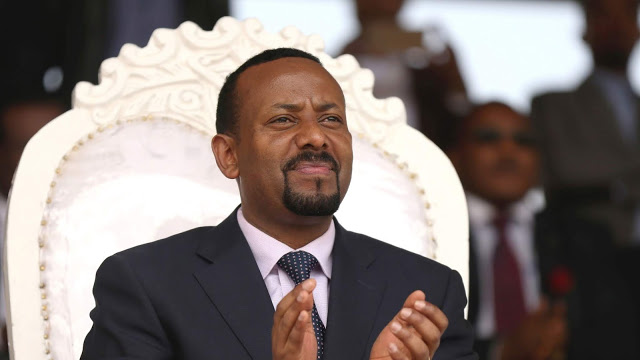 |
| Presiding over change. (Reuters/Tiksa Negeri) |
At 41
years of age, Ethiopia’s prime minister Abiy Ahmed Ali is the youngest head of
government in Africa. Since coming to power two months ago, Abiy has made
headlines globally as a reform-minded, polyglot politician , an
establishment insider with a mixed religious background who could introduce
change and push the country towards a path of unity and democratization.
years of age, Ethiopia’s prime minister Abiy Ahmed Ali is the youngest head of
government in Africa. Since coming to power two months ago, Abiy has made
headlines globally as a reform-minded, polyglot politician , an
establishment insider with a mixed religious background who could introduce
change and push the country towards a path of unity and democratization.
Abiy
replaced Hailemariam Desalegn, who resigned in February following over two
years of protests that led to the death of hundreds and the detention of
tens of thousands others. In his maiden speech to parliament, he spoke of dignity,
free expression, and national unity, and noted that “Democracy is unthinkable
without freedom.” Since then, Abiy has taken a series of bold steps that
showcased the ruling Ethiopian People’s Revolutionary Democratic Front (EPRDF)
meant business.
replaced Hailemariam Desalegn, who resigned in February following over two
years of protests that led to the death of hundreds and the detention of
tens of thousands others. In his maiden speech to parliament, he spoke of dignity,
free expression, and national unity, and noted that “Democracy is unthinkable
without freedom.” Since then, Abiy has taken a series of bold steps that
showcased the ruling Ethiopian People’s Revolutionary Democratic Front (EPRDF)
meant business.
In April,
Abiy ended an internet blackout, reinstituting both
mobile and broadband internet services across the country. Addis Ababa also dismissed charges against diaspora-based media
outlets, who commanded huge viewership and produced original reporting during the
anti-government protests. Thousands of prisoners were also freed and charges against them dropped
including prominent opposition leaders and journalists such as Bekele Gerba,
Eskinder Nega, Berhanu Nega, and Andargachew Tsege, a British citizen who was seized during a stopover in Yemen in 2014.
Abiy ended an internet blackout, reinstituting both
mobile and broadband internet services across the country. Addis Ababa also dismissed charges against diaspora-based media
outlets, who commanded huge viewership and produced original reporting during the
anti-government protests. Thousands of prisoners were also freed and charges against them dropped
including prominent opposition leaders and journalists such as Bekele Gerba,
Eskinder Nega, Berhanu Nega, and Andargachew Tsege, a British citizen who was seized during a stopover in Yemen in 2014.
 |
Abiy was
elected on the back of protesters demanding real change. (Reuters/Tiksa Negeri)
elected on the back of protesters demanding real change. (Reuters/Tiksa Negeri)
However,
the biggest political move to come out of Abiy’s election is his engaging of the exiled Ethiopian opposition
party, the Oromo Democratic Front. A delegation of the leaders was even allowed to return to widen the space for peaceful
negotiation. This followed a series of important political gestures including
discussions to introduce a two-term limit for prime instead of the
current unlimited terms. Abiy has also promised to help reform the judiciary,
reshuffled the cabinet, and appointed civilians to key positions including at
the Information Network Security Agency that oversees cybersecurity.
the biggest political move to come out of Abiy’s election is his engaging of the exiled Ethiopian opposition
party, the Oromo Democratic Front. A delegation of the leaders was even allowed to return to widen the space for peaceful
negotiation. This followed a series of important political gestures including
discussions to introduce a two-term limit for prime instead of the
current unlimited terms. Abiy has also promised to help reform the judiciary,
reshuffled the cabinet, and appointed civilians to key positions including at
the Information Network Security Agency that oversees cybersecurity.
Abiy also
made several trips abroad, helping free Ethiopian detainees in Saudi Arabia,
Sudan, and Kenya. He also recently hinted at introducing visa-free travel introducing visa-free travel for all Africans to
Ethiopia.
made several trips abroad, helping free Ethiopian detainees in Saudi Arabia,
Sudan, and Kenya. He also recently hinted at introducing visa-free travel introducing visa-free travel for all Africans to
Ethiopia.
For now,
the new premier is sounding all the positive notes . Yet Ethiopia
observers have remained cautious in their analysis, saying the flickers of hope
don’t necessarily constitute effective and long-lasting change. After all,
Ethiopia remains under a state of emergency, is still
largely a one-party state, whose operatives are yet to loosen their grip on the economy or security
apparatus, while the anti-terror laws that were used to stifle dissent are
still in place.
the new premier is sounding all the positive notes . Yet Ethiopia
observers have remained cautious in their analysis, saying the flickers of hope
don’t necessarily constitute effective and long-lasting change. After all,
Ethiopia remains under a state of emergency, is still
largely a one-party state, whose operatives are yet to loosen their grip on the economy or security
apparatus, while the anti-terror laws that were used to stifle dissent are
still in place.
Roland
Ebole, a senior Horn of Africa officer with advocacy group Freedom House argues
that it’s too early to “start deciding on Ethiopia’s trajectory” or know if
Abiy is truly walking the talk. “Let the man finish talking and doing the work
because he’s not yet done,” he said.
Ebole, a senior Horn of Africa officer with advocacy group Freedom House argues
that it’s too early to “start deciding on Ethiopia’s trajectory” or know if
Abiy is truly walking the talk. “Let the man finish talking and doing the work
because he’s not yet done,” he said.




